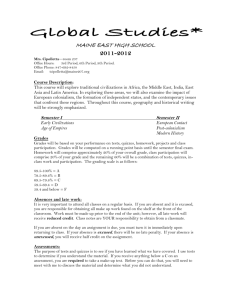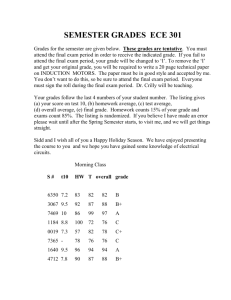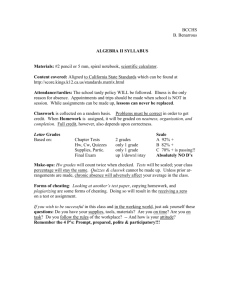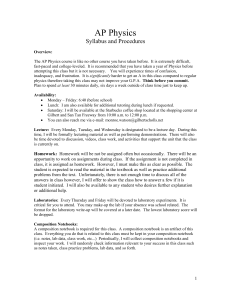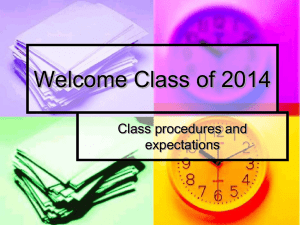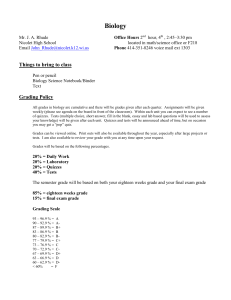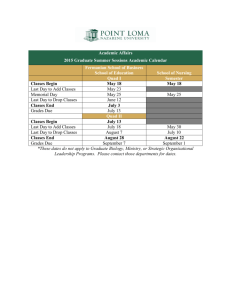Advanced Historical Analysis 2351
advertisement
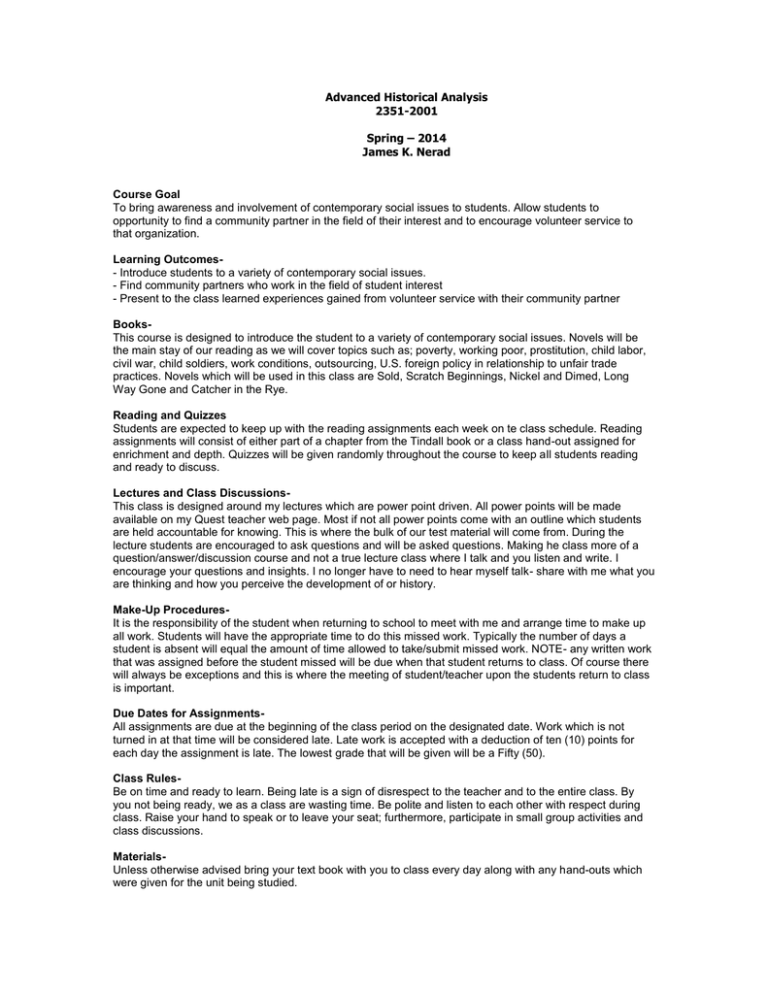
Advanced Historical Analysis 2351-2001 Spring – 2014 James K. Nerad Course Goal To bring awareness and involvement of contemporary social issues to students. Allow students to opportunity to find a community partner in the field of their interest and to encourage volunteer service to that organization. Learning Outcomes- Introduce students to a variety of contemporary social issues. - Find community partners who work in the field of student interest - Present to the class learned experiences gained from volunteer service with their community partner BooksThis course is designed to introduce the student to a variety of contemporary social issues. Novels will be the main stay of our reading as we will cover topics such as; poverty, working poor, prostitution, child labor, civil war, child soldiers, work conditions, outsourcing, U.S. foreign policy in relationship to unfair trade practices. Novels which will be used in this class are Sold, Scratch Beginnings, Nickel and Dimed, Long Way Gone and Catcher in the Rye. Reading and Quizzes Students are expected to keep up with the reading assignments each week on te class schedule. Reading assignments will consist of either part of a chapter from the Tindall book or a class hand-out assigned for enrichment and depth. Quizzes will be given randomly throughout the course to keep all students reading and ready to discuss. Lectures and Class DiscussionsThis class is designed around my lectures which are power point driven. All power points will be made available on my Quest teacher web page. Most if not all power points come with an outline which students are held accountable for knowing. This is where the bulk of our test material will come from. During the lecture students are encouraged to ask questions and will be asked questions. Making he class more of a question/answer/discussion course and not a true lecture class where I talk and you listen and write. I encourage your questions and insights. I no longer have to need to hear myself talk- share with me what you are thinking and how you perceive the development of or history. Make-Up ProceduresIt is the responsibility of the student when returning to school to meet with me and arrange time to make up all work. Students will have the appropriate time to do this missed work. Typically the number of days a student is absent will equal the amount of time allowed to take/submit missed work. NOTE- any written work that was assigned before the student missed will be due when that student returns to class. Of course there will always be exceptions and this is where the meeting of student/teacher upon the students return to class is important. Due Dates for AssignmentsAll assignments are due at the beginning of the class period on the designated date. Work which is not turned in at that time will be considered late. Late work is accepted with a deduction of ten (10) points for each day the assignment is late. The lowest grade that will be given will be a Fifty (50). Class RulesBe on time and ready to learn. Being late is a sign of disrespect to the teacher and to the entire class. By you not being ready, we as a class are wasting time. Be polite and listen to each other with respect during class. Raise your hand to speak or to leave your seat; furthermore, participate in small group activities and class discussions. MaterialsUnless otherwise advised bring your text book with you to class every day along with any hand-outs which were given for the unit being studied. Grading ScaleQuest Early College High School A = 90 – 100 B = 80 – 89 C = 75 – 79 D = 70 – 78 F = 69 and below Lone Star College A = 90 – 100 B = 80 – 89 C = 70 – 79 D = 60 – 69 F = 68 and below Please note that there are two different grading scales and final grades for each school might reflect a different average. Grades will be entered into Quest’s eSchool grade book on a weekly basis and will show a current class average. Formative grades – 30% of the final grade Quizzes, daily work, homework, classroom discussions, and classroom activities Summative grades – 70% of the final grade Tests, projects, major presentations, papers/essays, formal classroom discussions Final AssessmentQuest Early College High School will administer Final Semester Assessments at the end of each semester. These grades will be averaged with the other semester grades as Summative Assessments. Progress Reports will be distributed every three weeks. Academic Integrity The Lone Star College System upholds the core values of learning: honesty, respect, fairness, and accountability. The system promotes the importance of personal and academic honesty. The system embraces the belief that all learners- students, faculty, staff and administrators- will act with integrity and honesty and must produce their own work and give appropriate credit to the work of others. Fabrication of sources, cheating, or unauthorized collaboration is not permitted on any work submitted within the system. The consequences for academic dishonesty are determined by the professor, or the professor and academic dean, or the professor and chief student services officer and can include but are not limited to: 1. Having additional class requirements imposed 2. Receiving a grade of zero or “F” for an exam or assignment 3. Receiving a grade of “F” for the course 4. Being withdrawn from the course or program 5. Being expelled from the college system. . Americans with Disabilities Act Statement Lone Star College-Kingwood is dedicated to providing the least restrictive environment for all students. We promote equity in academic access through the implementation of reasonable accommodations as required by the Vocational Rehabilitation Act of 1973, Title V, Section 504 and the Americans with Disabilities Act of 1990 (ADA) which will enable students with disabilities to participate in and benefit from all post-secondary educational activities. Where We Are Headed “Getting Involved in Social Issues” Weeks One & Two Essential QuestionWhat contribution will you as a senior make your last semester? Lessons Introduction to the class and class goals Read The Catcher in the Rye Complete Catcher project packet Take home final novel essay Weeks Three & Four Essential QuestionAre you the coffee, carrot or the egg? Lessons World Population and feeling the needy Life Boat Ethics An Apple as the Earth Similarities in world culture Weeks Five & Six Essential Question“What handy cap would the “Handy Cap General” place on you? Lessons Short story Harrison Bergeron Discussion over free speech “Tinker Readings” Create a P.S.A. on a banned book Weeks Seven & Eight Essential Question“What are your Big Ten Social Issues?” LessonsBrain Storm list of Big Ten What stars share your passion? Introduce the Fine Arts Project on social issues Weeks Nine & Ten Essential Question“How many have to die before they call it Genocide”? Lessons Generate list of social issues Power point – Genocide Share Fine Arts Projects with class Begin to read Long Way Gone Weeks Eleven & Twelve Essential Question"What do all bullies have in common?" LessonsWatch episode from "Glee" which deals with bullies Reflective writing on their take of the show and bullies in general Assign for reading "The Further Adventures of Slugger MacBatt" Weeks Thirteen & Fourteen Essential Question“Where does the majority of your clothing come from?” LessonChild Labor Sweating for a T-shirt - film Race to the Bottom - film Weeks Fifteen & Sixteen Essential Question“ What’s in it for me?” – U.S. Foreign Policy Lessons Classroom simulation- U.S. foreign policy Weeks Seventeen & Eighteen Essential Question“How can we keep our children safe in schools?” LessonsBegin reading Nineteen Minutes Weeks Nineteen & Twenty Essential QuestionWhy not go make the ‘Johns’ the example and not the girls?” Lessons Assign the novel Sold Take home essay over novel Films dealing with child prostitution
